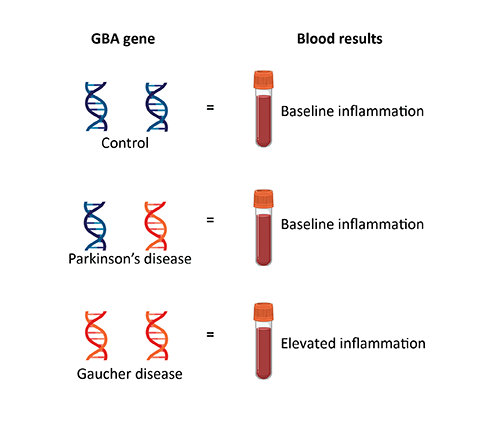Galper J, Balwani M, Fahn S, Waters C, Krohn L, Gan-Or Z, Dzamko N, Alcalay RN. Cytokines and Gaucher Biomarkers in Glucocerebrosidase Carriers with and Without Parkinson Disease. Mov Disord. 2021 Jun;36(6):1451-1455
Parkinson’s disease is a neurological condition whereby the neurons controlling movement degenerate. The cause of this neurodegeneration is unknown, although alterations to certain genes increase Parkinson’s disease risk. Recently, a new risk gene known as GBA has come to light. Alterations (or mutations) to the GBA gene were previously known to cause Gaucher disease. However, novel evidence has demonstrated that GBA gene mutations also increase the risk of Parkinson’s disease. Gaucher disease patients, who have two mutated copies of the GBA gene, have increased inflammation evident in their blood, and since some Parkinson’s patients also have mutations in the GBA gene, we investigated whether we would also find inflammation in the blood of Parkinson’s disease patients. In other words, we wanted to know whether markers that are known to be elevated in the blood of Gaucher patients would also be elevated in Parkinson’s disease patient blood since the two diseases share the same damaged gene. This information would help researchers understand the extent to which inflammation may contribute to the development of Parkinson’s disease and whether inflammatory markers could be used to identify at risk individuals that may benefit from immunomodulatory clinical trials.

We investigated inflammatory markers in blood samples from a relatively large cohort of 218 individuals with a GBA gene mutation and 152 individuals without a GBA gene mutation. We found that if individuals had two mutated copies of the GBA gene, as is the case for Gaucher disease patients, then there was evidence of increased inflammatory markers in the blood. However, if individuals only had one mutated copy of the GBA gene, as is the case for Parkinson’s disease patients and those at risk of Parkinson’s, there was no increased inflammation compared to those with no mutations. These findings suggest that inflammatory markers in the blood of GBA gene mutation carriers at risk of Parkinson’s disease are not promising tools to identify who is at the highest risk of developing Parkinson’s disease or stratifying who may benefit from immunomodulatory clinical trials.